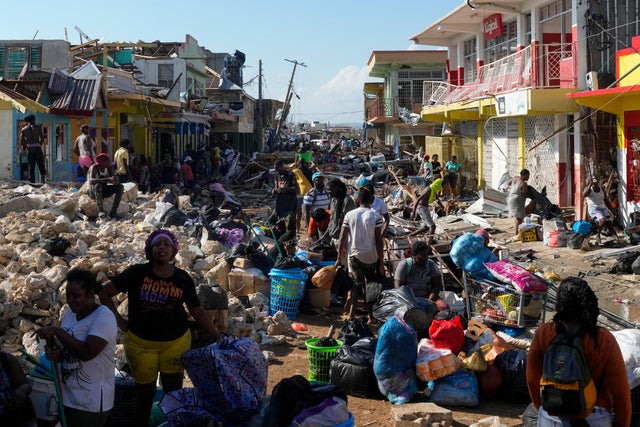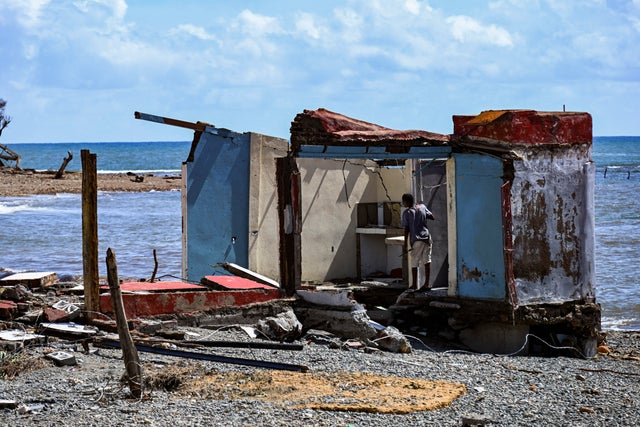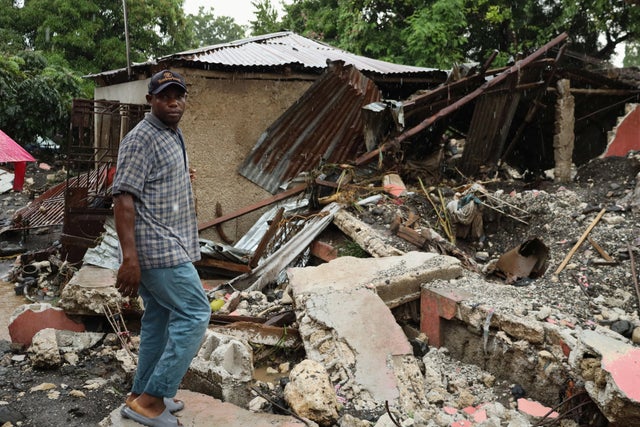Hurricane Melissa death toll surpasses 50, mostly in Jamaica and Haiti, as focus turns to recovery
/ CBS/AP
In the ruins of Black River, which the Jamaican government has described as Hurricane Melissa's "ground zero," people are scrambling for relief.
"People are hungry," said Monique Powell as she stood watch over a stash of groceries and household items for herself and a group of residents from another hurricane-torn community nearby.
Melissa came ashore just west of Black River on Tuesday as one of the most powerful Atlantic hurricanes on record, leaving up to 90% of all structures in the town without roofs as it snapped power lines and toppled concrete structures.
The storm was being blamed for at least 51 deaths, mostly in Haiti and Jamaica. It also hit Cuba hard. Authorities said 19 people were killed in Jamaica, at least 31 in Haiti and at least one in the Dominican Republic.
Melissa was over the open waters of the Atlantic after racing past Bermuda early Friday, packing 90 mph maximum sustained winds, the Miami-based U.S. National Hurricane Center said. It became a post-tropical cyclone by late Friday morning, the center said.
In Jamaica, helicopters hovered over isolated communities, dropping food as crews rushed to reopen roads.
"You are not forgotten," said Daryl Vaz, energy and transport minister.

Christopher Boxe, a restaurant owner in Kingston, Jamaica, noted the stark differences in how various parts of the island fared.
"This morning has felt like we live in two Jamaicas, you know, Jamaica, where, like most people are going to work in Kingston and their homes have minimal damage, and then you have the other half, which looks just devastated. And it's heartbreaking," he told CBS News.
More than 7,000 people remained in shelters, with 66% of the island without power and around half of the nation's water systems offline, officials said at a news conference Friday. People clutched cash as they formed long lines at the few gas stations and supermarkets open in affected areas.
Officials said the dead in Jamaica included a child, and they expected the death toll to keep rising. In one isolated community, residents pleaded with officials to remove the body of a victim tangled in a tree. On Thursday, dozens of U.S. search-and-rescue experts landed in Jamaica along with their dogs.
No reported deaths but Cuba far from spared
In Cuba, heavy equipment began to clear blocked roads and highways and the military helped rescue people trapped in isolated communities and at risk from landslides.
No deaths were reported after the Civil Defense evacuated more than 735,000 people across eastern Cuba ahead of the storm. Residents were slowly starting to return home Thursday.

The town of El Cobre in the eastern province of Santiago de Cuba was one of the hardest hit. Home to some 7,000 people, it is also the site of the Basilica of Our Lady of Charity, the patron saint of Cuba who is deeply venerated by Catholics and practitioners of Santería, an Afro-Cuban religion.
"We went through this very badly. So much wind, so much wind. Zinc roofs were torn off. Some houses completely collapsed. It was a disaster," said Odalys Ojeda, a 61-year-old retiree, as she looked up at the sky from her living room, where the roof and other parts of the house were torn away.
Even the basilica was hit.
"Here at the sanctuary, the carpentry, stained glass and even the masonry suffered extensive damage," Father Rogelio Dean Puerta said.
A televised Civil Defense meeting chaired by President Miguel Díaz-Canel didn't provide an official estimate of the damage. However, officials from the affected provinces — Santiago, Granma, Holguín, Guantánamo and Las Tunas — reported losses of roofs, power lines and fiber optic telecommunications cables, as well as roads cut off, isolating communities, and heavy losses in banana, cassava and coffee plantations.
Many communities were still without electricity, internet and telephone service because of downed transformers and power lines.
In an unusual statement on Thursday, the U.S. State Department said Washington was "ready to assist the Cuban people." It said the U.S. "is prepared to provide immediate humanitarian assistance directly and through local partners who can deliver it more effectively to those in need."
The statement didn't specify how the cooperation would be coordinated or whether contact had been made with the Cuban government, with which it maintains a bitter conflict that includes six decades of economic and financial sanctions.
Haiti reeling
Melissa also unleashed catastrophic flooding in Haiti, where authorities reported at least 31 people killed and 21 others missing, mostly in the country's southern region. More than 15,000 people also remained in shelters.
"It is a sad moment for the country," said Laurent Saint-Cyr, president of Haiti's transitional presidential council.

He said officials expect the death toll to rise and noted that the government was mobilizing resources to search for people and provide emergency relief.
Haiti's Civil Protection Agency said Hurricane Melissa killed at least 20 people, including 10 children, in Petit-Goâve, where more than 160 homes were damaged and 80 others destroyed.
Steven Guadard said Melissa killed his entire family in Petit-Goâve, including four children ranging in age from 1 month to 8 years.
Michelet Dégange, who has lived in Petit-Goâve for three years, said Melissa left him homeless.
"There is no place to rest the body; we are hungry," he said. "The authorities don't think about us. I haven't closed my eyes since the bad weather began."




0 Comments
Yorum ekle